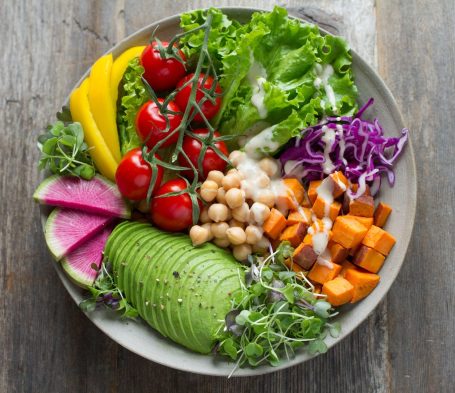
What to Consume to Fight Depression and Promote Mental Health
Vitamins, Minerals, and Foods
- Omega-3 Fatty Acids
Omega-3 fatty acids are a type of polyunsaturated fat. Polyunsaturated fats are a broken-down form of unsaturated fats, which perform important functions in the body such as making up cell membranes, supporting cell communication, and supporting the cardiovascular system (U.S. Department of Health and Human Services).
How They Combat Depression:
A study was conducted to find the role of omega-3 fatty acids as a treatment for depression. Patients with depression were divided into three groups. In Group One, patients were given omega-3 fatty acid supplements with no antidepressants, Group Two was only given antidepressants, and Group Three took omega-3 supplementation with antidepressants. Once a month for three months the patient's depression was tested through the Hamilton Depression Rating Scale (HDRS), a common questionnaire that assesses depressive symptoms. After the third follow-up, the HDRS scores were significantly lower for patients simultaneously taking omega-3 supplements and antidepressants than other groups (Mehdi, Seema, et al.).
Foods that contain omega-3 fatty acids:
- Chia seeds
- Avocado
- Soymilk
- Tofu
- Edamame
- Salmon
- Kale
2. Magnesium
Magnesium is a mineral that is found in ample amounts in the body. It is responsible for nerve and muscle functions, blood pressure regulation, and the creation of proteins and DNA (U.S. Department of Health and Human Services).
How It Combats Depression:
A study dedicated to studying magnesium as a treatment for depression held a six week active treatment period where patients with depression were given elemental magnesium daily through magnesium chloride supplements. The second part of the study was a six week control period where no magnesium was consumed, only antidepressants. The depressive symptoms of the patient were measured with the Patient Health Questionnaire (PHQ-9) to assess their levels of depression. During the six week active period, the patients had a greater decrease in their PHQ-9 scores than in the control period (Tarleton, Emily K et al.).
Foods that contain magnesium:
- Spinach
- Kale
- Almonds
- Brown rice
- White beans
- Chickpeas
- Buckwheat
- Sweet potatoes
3. B12
Vitamin B12 is one of the eight B vitamins and plays a vital role in maintaining healthy nerve and blood cells and synthesizing DNA. Its deficiency can lead to fatigue, nausea, irritability, and headaches (U.S. Department of Health and Human Services).
How It Combats Depression:
A trial was conducted to determine vitamin B12 supplementation in treating depression. The participants experienced depression and were randomized into a control arm, where they were only given antidepressants, or a treatment arm, where they were given antidepressants and injectable vitamin B12 supplementation. At the three month follow-up, their depressive symptoms were measured with the Hamilton Depression Rating Scale (HDRS). The treatment arm had a higher percent of patients with a greater decrease in their HDRS scores than in the control arm (Syed, Ehsan Ullah et al.).
Foods that contain B12:
- Beef liver
- Clams
- Salmon
- Eggs
- Tuna
4. Probiotics/Gut-Healthy Foods
Probiotics are live bacteria and yeasts that contribute to a healthy community of microorganisms in the body. Probiotics, alongside other gut-friendly foods, support gastrointestinal health, the digestive system, and immunological responses (Mikstas).
How They Combat Depression:
In a randomized clinical trial, patients taking antidepressants participated in a double-blind placebo-controlled trial to determine the effect of probiotics on depressive symptoms. The participants were randomized into a probiotic group or a placebo group. For eight weeks, the probiotic group were given a probiotic daily and the placebo group took a placebo daily. Their depressive symptoms were measured with the Hamilton Depression Scale 17- item scale (HAMD-17). After the eight weeks, the probiotic group had a greater decrease in their HAMD-17 scores than the placebo group (Nikolova VL, Cleare AJ, et al.).
Gut-healthy foods:
- Probiotic Greek yogurt
- Dark chocolate
- Miso
- Kimchi
- Saeurkraut
- Kefir
References
U.S. Department of Health and Human Services. (n.d.-b). Office of dietary supplements - omega-3 fatty acids. NIH Office of Dietary Supplements. https://ods.od.nih.gov/factsheets/Omega3FattyAcids-Consumer/
Mehdi, Seema, et al. “Omega-3 Fatty Acids Supplementation in the Treatment of Depression: An Observational Study.” Journal of personalized medicine vol. 13,2 224. 27 Jan. 2023, doi:10.3390/jpm13020224
U.S. Department of Health and Human Services. (n.d.-a). Office of dietary supplements - magnesium. NIH Office of Dietary Supplements. https://ods.od.nih.gov/factsheets/Magnesium-HealthProfessional/
Tarleton, Emily K et al. “Role of magnesium supplementation in the treatment of depression: A randomized clinical trial.” PloS one vol. 12,6 e0180067. 27 Jun. 2017, doi:10.1371/journal.pone.0180067
U.S. Department of Health and Human Services. (n.d.). Office of dietary supplements - vitamin B12. NIH Office of Dietary Supplements. https://ods.od.nih.gov/factsheets/VitaminB12-HealthProfessional/
Syed, Ehsan Ullah et al. “Vitamin B12 supplementation in treating major depressive disorder: a randomized controlled trial.” The open neurology journal vol. 7 44-8. 15 Nov. 2013, doi:10.2174/1874205X01307010044
Mikstas, Christine. “What Are Probiotics? Probiotic Supplements, Foods, Uses, Benefits, and Safety.” What Are Probiotics?, WebMD, 1 April 2022, https://www.webmd.com/digestive-disorders/what-are-probiotics. Accessed 4 September 2023.
Nikolova VL, Cleare AJ, Young AH, Stone JM. Acceptability, Tolerability, and Estimates of Putative Treatment Effects of Probiotics as Adjunctive Treatment in Patients With Depression: A Randomized Clinical Trial. JAMA Psychiatry. 2023;80(8):842–847. doi:10.1001/jamapsychiatry.2023.1817
©Copyright. All rights reserved.